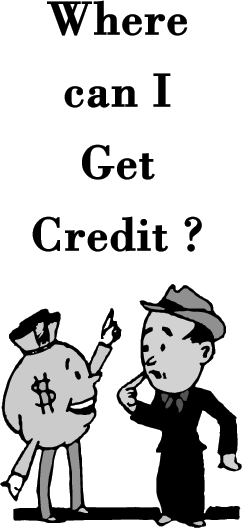Where Can I Get Credit?
A fact sheet that explains various sources where consumers can obtain credit, such as banks, credit unions, finance companies and pawnbrokers.

Where Can I Get Credit?
Credit is available from by many sources. For this reason it is important to compare the different sources. The following are some of the sources of credit:
Banks
They loan cash. You sign a legal contract when you borrow money. Some loans are made where you must have a guarantee beyond the promise to repay (such as a car). Other loans - usually for smaller amounts of money - are made for which only your promise to repay is required.
Bank Cards
They are usually issued by banks and may be used to buy items, services or receive cash advances. Many institutions charge an annual fee for the use of these cards and they have a credit limit.
Credit Unions
You must be a member of the credit union in order to get a loan or a credit card. The interest rate they charge is usually the lowest.
Savings and Loan Institutions
Most of their loans are made to buy, build or improve your house. They also make loans for other reasons.
Finance Companies
A source of credit for people who are high risk in terms of their credit rating. They usually charge higher interest rates than banks, savings and loans associations and credit unions.
Pawnbrokers
To get cash, you must leave an item of value at the pawnshop and you usually receive half its resale value. If you do not pay by the date agreed upon, the item you left will be sold. Pawnshops charge high interest rates.
Installment Plans
Used to buy things that cost a lot such as a washing machine or a range. You make a down payment and then pay the balance plus interest on a weekly or monthly basis. If you fail to make a payment the store can repossess the item.
Charge Accounts
You buy the merchandise and the store sends you a bill. If you do not pay the bill in full, an interest charge is added to the next bill.
Illegal Lenders
Some lenders operate outside the law. They may charge higher interest rates than pawnshops. These lenders often take advantage of people.
© Copyright 1992 Home Economics Department, Institute of Food and Agricultural Sciences, University of Florida, Gainesville
Funded by the National Coalition for Consumer Education and AT&T Consumer Credit Education Fund
Electronic publication produced by Consumer Action
Electronic publication funded by AT&T Universal Card
Published / Reviewed Date
Published: April 01, 1992
Download PDF
No Download Available
Sponsors
Filed Under
Credit ♦
Copyright
© 1992 –2024 Consumer Action. Rights Reserved.



